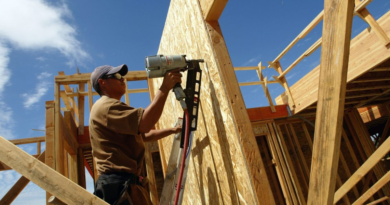America's 4th-largest city is electing a new mayor and has big problems to fix: 'It’s hard to be proud of strip centers'
The challenges facing Houston’s next mayor are familiar to many big cities: crime, crumbling infrastructure, budget shortfalls and a lack of affordable housing.
But in November’s marquee mayoral election in the U.S., the top candidates promising to turn Houston around are two Democrats who have held power in the city longer than almost anyone, leaving outsiders scrambling to get a foothold as early voting is set to begin Monday.
U.S. Rep. Sheila Jackson Lee took office in 1995, about two decades after state Sen. John Whitmire started in the Texas Legislature. Both have commanded the spotlight and money in the race to lead America’s fourth-largest city, where booming growth has caused municipal headaches but also turned the Houston area into an expanding stronghold for Texas Democrats.
“This (new) mayor comes along at a time when the city is doing well, though the city faces issues,” said Bob Harvey, president and CEO of the Greater Houston Partnership, a local business group.
Ahead of the Nov. 7 election, many of the 18 candidates vying to lead Houston have tried to strike a balance. They highlight what they see as Houston’s failings while touting it as an international city teeming with diversity. They focus on how the city long ago shed its image as a place carved out of concrete where urban cowboys work in the oil and gas industry.
Although the mayoral race is nonpartisan, most of the candidates are Democrats. They are seeking to replace Mayor Sylvester Turner, who has served eight years and can’t run again because of term limits.
With such a crowded field, it’s unlikely any candidate will get 50% of the vote to avoid a runoff.
Others in contention are former head of Houston’s public transit system Gilbert Garcia, attorney Lee Kaplan, Houston City Councilman Robert Gallegos and former council members Jack Christie and M.J. Khan.
People who don’t live in Texas see it as “uncultured” and “dominated by oil and gas,” Garcia said.
“If they came here, they’d see we’re much more. We’re a cosmopolitan city. But we can do better and we should be better,” said Garcia, who has poured more than $3 million of his own money into the race.
Democrats also worry the stakes of the election go beyond picking a new mayor.
A new law signed by Republican Gov. Greg Abbott clears the way for the state to take control of voting in Harris County, which includes Houston, if it determines elections are not properly run.
Voting rights groups have expressed worries that Republicans will seize on problems in the coming weeks, such as polling locations opening late or long lines due to problems with voting machines, as a pretext to assume oversight of elections in Texas’ largest county in 2024.
While crime in Houston, like in other major cities dramatically rose during the pandemic, it has since dropped. Houston Police Chief Troy Finner on Wednesday said crime overall is down 5% compared to the same period last year, with killings down nearly 18%.
Despite the downward trend, Whitmire has emphasized lowering crime.
“Certainly, public safety will be my highest priority,” he said during a mayoral debate Thursday.
The city’s challenges are due in part to its explosive growth over the past decade. Compared to the 20 most populous metropolitan areas in the U.S., Houston ranked third in growth, adding more than 140,000 residents between 2012 and 2022, said Patrick Jankowski, chief economist for the Greater Houston Partnership.
Houston grew rapidly and it didn’t make the needed investments to maintain its streets, water systems and other infrastructure, said Bill King, a businessman and former mayoral candidate who blogs about politics.
Complicating the next mayor’s efforts to deal with pothole-riddled streets will be a potential budget shortfall of up to $300 million.
All of these problems will impede the city’s efforts to invest in its future, one where Houston is trying to move away from an economy tied mainly to the oil industry, said Brandon Rottinghaus, a University of Houston political science professor.
Jackson Lee, whose campaign has touted her experience securing federal funding in Congress, said she’s aware of Houston’s funding challenges to deal with problems like housing and crime.
“What we are going to do is find the most creative way to bring in revenue and put this city right on top with every other great city in America,” she said at a debate earlier this month.
Johnny Mata, a longtime activist with the Greater Houston Coalition for Justice, said he hopes the next mayor works to meet the needs of the city’s poor and underserved but also balances concerns over crime with proper oversight of police.
“There’s so many challenges ahead of us. And, of course, we have to be involved collectively to meet those challenges,” Mata said.
The city’s diversity has long been touted as one of its strengths. Of the city’s 2.3 million residents, 45% are Latino, with 23% Black and 24% white. One in every four Houston residents was born outside the U.S., Jankowski said.
Diversity will be one of the big selling points the next mayor will highlight as the city’s principal salesperson when trying to attract new investment, Harvey said.
“It’s hard to be proud of strip centers,” Harvey said of the nondescript and long-derided shopping centers dotting Houston’s urban landscape.
“But what strip centers allow are an immigrant to come to Houston and open a restaurant or a little retail establishment at a little micro-scale and be successful,” Harvey said. “We built our city around this idea that we welcome newcomers and that we’re building, creating opportunity.”



